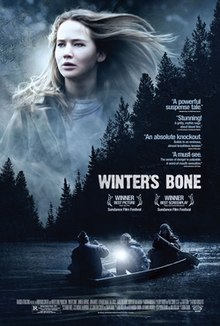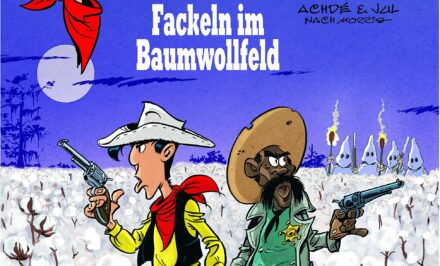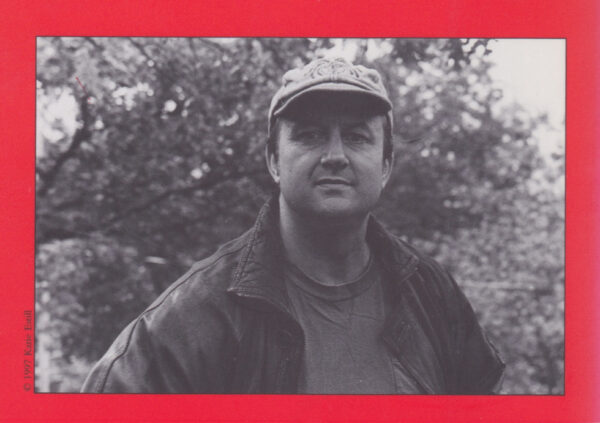
Daniel Woodrell, Dashiell Hammett and Me
For some years – a period that, for me, encompassed the first ten Resnick novels – Lonely Hearts to Last Rites – Daniel Woodrell and I shared the same publisher in the States, the redoubtable Marian Wood at Henry Holt & Company. Address: 115 West 18th St., New York 10011 – I remember it well.
Whereas Marian would have worked closely with Dan from the first draft manuscript on, with Resnick she would have bought US and Canadian rights to books that already existed in published form. For many publishers that might mean little more than commissioning a new jacket, scouting out some blurbs that would mean something to American consumers, and maybe – just maybe – sending a junior through the manuscript with the task of Americanising those ‘difficult’ British terms which might defeat US readers – ‘elevator’ for ‘lift’ and ‘sidewalk’ instead of ‘pavement’. Not so Marian. She was as eager to get to grips with the text as would have been the case were she the primary editor, and, more importantly, she was keen to make suggestions as to how the series and its central characters might best be developed, pointing out weaknesses that should and could be avoided. When, in Easy Meat,for instance, I ventured to set Resnick up in a relationship with a teacher named Hannah Campbell, Marian argued quite fiercely that I should make her a far stronger character than she first appeared to be, more conscious of the feminist issues of the time.
Most importantly, she championed my books, just as she did Dan’s, in the face of sales figures that would have had Holt’s accountants sadly shaking their heads. We were her authors, her boys, and she believed in us, which didn’t mean she was above putting us in our place if she thought it was deserved; the only reason I can get away with publishing the pair of you, she pointed out on more than one occasion, is because I also publish Sue Grafton.
I first met Dan Woodrell in St. Louis, probably the largest city close to the Ozarks, the vast rural area of Missouri where he had been born and continued to live. Both with new books out – Dan’s Give Us a Kiss (the one that gave birth to the term Country Noir) and my 8th Resnick, Easy Meat – we were due to appear at Big Sleep Books, then under the management of Helen Simpson. I assumed that, in the normal way of things, I would read an extract from my novel before chatting amiably to would-be customers and, finally, signing as many copies as I could lay my hands on – the usual malarkey – and I’d imagined Dan would do the same. But no. Dan doesn’t read, Helen said. He just doesn’t. Ever. He’s shy. Which would have left me showcasing, while Dan sat quietly in the corner, nursing a beer. It didn’t seem right. Okay, I said, tell him if he won’t read then I won’t either. [Clearly, to anyone who knows me, a barefaced lie: given an audience in excess of one I’ll read till someone finally puts out all the lights and jiggles the keys.] To Helen’s surprise, however, Dan agreed. Perhaps he was being polite to a fellow author visiting from across the Atlantic. And, of course, he read brilliantly, bringing out every nuance of the language, every ounce of humour, every frisson of sexuality, and left me thanking the heavens I’d read first!
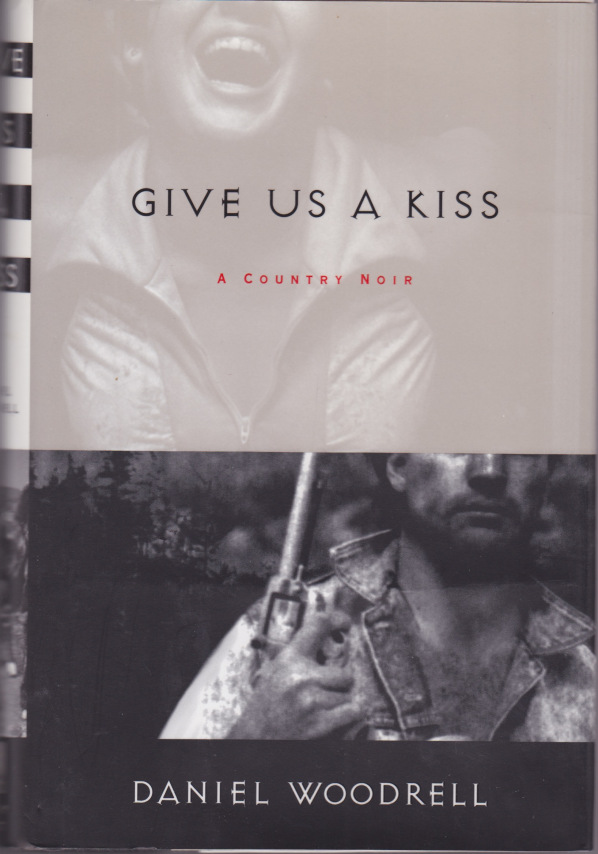
Give Us a Kiss is told in the first person, its central character, Doyle Redmond, is Ozark born and bred, a writer who – like so many of us at times – feels his work is both undersold and misunderstood. Dan getting some of his frustrations out into the open. Here’s a couple of examples …
I always get called a crime writer, though to me they are slice-of-life dramas. They remind me of my family and friends, actually. I hate to think I’ve led a “genre” life, but that seems to be the category I’m boxed in.
… and …
I sat up, crossed my legs beneath me. “When I’m dead they’ll say I was ‘passionate and ruggedly self-reliant,’” I claimed.
“Oh, Doyle.” Lizbeth’s lips had that puffy, tenderer look lips get from deep kissing someone new. “They’re not going to talk about you when you’re dead.”
That sealed the end. That comment. This was the sorest spot she could gouge at, my life’s work to this point being four published novels nobody much had read, let alone bought or reviewed prominently. This sore spot of mine had yet to quit oozing since the last book had been met with a great, vicious silence, and for her to stick me there meant it was over for sure.
Some time after our meeting in St. Louis, Dan and his wife, the novelist, Katie Estill, moved, temporarily, to San Francisco, which is where my partner, Sarah, and I got to hang out with them a little. One of the reasons Dan had been attracted to San Francisco was its associations with Dashiell Hammett, a writer he greatly admired; Hammett had lived there in the 1920s, and it was there, in a top floor apartment on Post Street, that he had written the bulk of The Maltese Falcon. So, in honour to both Hammett and his private eye, Sam Spade, we went to John’s Grill, which has long traded on its association with The Maltese Falcon, and ordered the over-priced but tasty lamb chops, as briefly featured in in the novel …
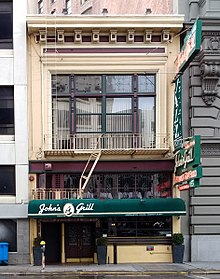
He went to John’s Grill, asked the waiter to hurry his order of chops, baked potato, and sliced tomatoes, ate hurriedly, and was smoking a cigarette with his coffee when a thick-set youngish man with a plaid cap set askew above pale eyes and a touch cheery face came into the Grill and to his table.
“All set, Mr Spade. She’s full of gass and rearing to go.”

We also went to Burritt Street, where Spade’s partner, Miles Archer, was lured to his death by his seemingly innocent client, Brigid O”Shaughnessy, and not shot and killed, as she had claimed, by one Floyd Thursby.
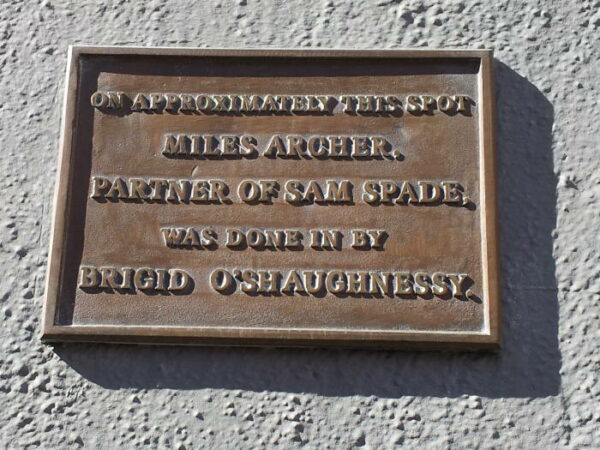
Spade said” “Miles hadn’t many brains, but, Christ! he had too many years’ experience as a detective to be caught like that by a man he was shadowing. Up a blind alley with his gun tucked away on his hip and his overcoat buttoned? Not a chance. He was a dumb as any man ought to be, but he wasn’t quite that dumb …
He ran his tongue over the inside of his lips and smiled affectionately at the girl. He said: “But he’d’ve gone up there with you, angel, if he was sure nobody else was up there. You were his client, so he would have had no reason for not dropping the shadow on your say-so, and if you caught up with him and asked him to go up there he’d’ve gone. He was just dumb enough for that. He’d’ve looked you up and down and licked his lips and gone grinning from ear to ear – and then you could’ve stood as close to him as you liked in the dark and put a hole through him with the gun you had got from Thursby that evening.”
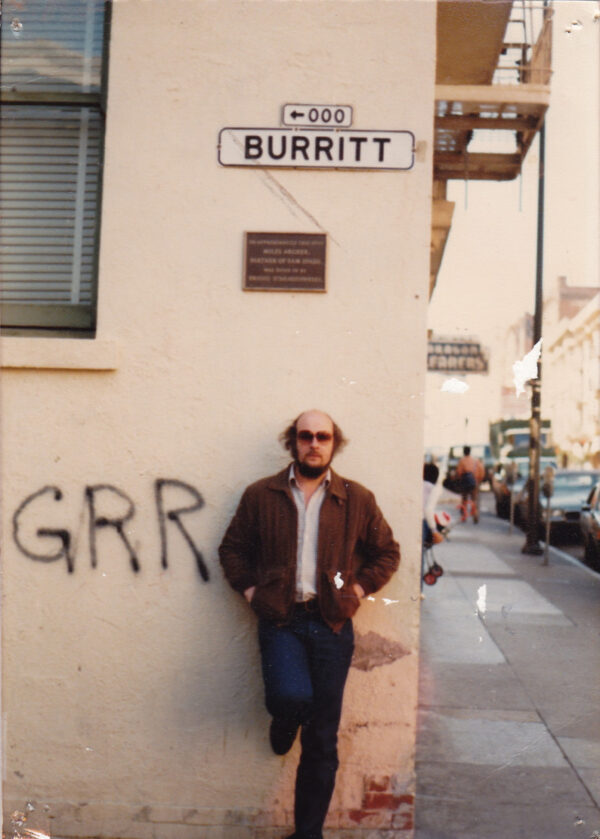
Finally, before leaving the subject of Daniel Woodrell, it’s worth noting that of his nine novels, three have been turned into films: not a bad ratio. Woe to Live Onwas filmed by Ang Lee in 1999 under the title, Ride With the Devil; Debra Granik made Winter’s Bone in 2010; and Tomato Red was filmed by Juanita Wilson in 2017. Of the three, it seems to me that Winter’s Bone is the most successful. In part this may be due to the fact that it was largely filmed in the Ozarks, where the novel is set, and Dan, I believe, helped both with the locations and in persuading some of the locals to take part. Without losing on the finer points of atmosphere and characterisation, Granik never allows the pace of the narrative to slacken, and she secures a compelling performance from Jennifer Lawrence in her ‘breakthrough’ role.
